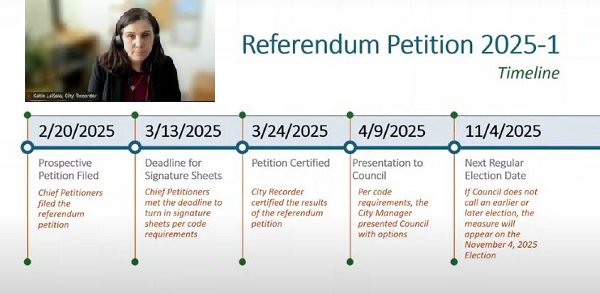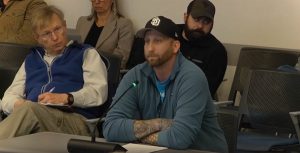Council weighs options on fire fee referendum; city manager again rejects meeting on budget priorities
7 min read
Presenter: The City Council voted unanimously Wednesday to meet April 21 to consider its response to the fire fee referendum. City Recorder Katie LaSala told councilors April 9 they have several options:
Katie LaSala (Eugene, city recorder): Council has the option to repeal the ordinance referred by a referendum petition; Council can vote to urge adoption or defeat of the referred measure; or Council could order a submission of alternative measure or measures to be voted on at the same election as the referred measure.
[00:00:28] If Council chooses to take no action during this meeting or at a future date, the measure will appear on the ballot in November, and there’s no motion needed for that. Council could choose to call an emergency election. If that is a process that Council’s interested in, I can walk you through the process steps as needed.
[00:00:47] Presenter: Mayor Kaarin Knudson:
[00:00:49] Kaarin Knudson (Eugene, mayor): I’ve been talking with a lot of people in our community. I do think that there is a sincere hope that we can always as a body be working towards outcomes that feel like we’re working together and that are shared. And it feels from certain conversations I’ve had that there is more information needed, and more work that we can do to build understanding about the really challenging pressures that our community is under.
[00:01:14] Presenter: Councilor Matt Keating:
[00:01:15] Councilor Matt Keating: If there are sticking points that could be collaboratively addressed and a new path forward—a new trajectory, an offramp that is not going to be divisive or costly to the tune of hundreds of thousands of dollars, that isn’t going to derail Council and our community’s good work—I want to explore what that option looks like.
[00:01:44] Presenter: Councilor Randy Groves:
[00:01:46] Councilor Randy Groves: I want to be very careful, whatever path we take, that we are not disrespecting the process that got us to this discussion today, where the signatures were gathered through a legal process to refer this to a vote.
[00:01:59] At the same time, if there’s a way to go forward, I mean, I don’t want to see our services significantly reduced either. But at the same time, how do we bring people together rather than causing further divide and polarization?
[00:02:12] Presenter: Councilor Eliza Kashinsky:
[00:02:14] Councilor Eliza Kashinsky: I agree with Councilor Groves that respecting the process that was gone through regarding the ballot measure is important. They went through that process and I feel like saying, ‘Let’s repeal this, let’s replace it with something else,’ is disrespectful to the folks who said, ‘Hey, we want to vote on this.’
[00:02:36] And we may be nervous about the outcome of that, but I would be deeply uncomfortable going against that request that the voters made to weigh in on this.
[00:02:46] I think that it’s a risk there. But at the same time, I also think that people in our community care about these services that are going to be cut without this fire fee. And they should have a chance to say so.
[00:03:00] Presenter: City budget deliberations will be even more complicated this year. With an upcoming referendum, staff members must now comply with election laws.
[00:03:09] Kathryn Brotherton (Eugene, city attorney): It was an election measure from the moment that the chief petitioners filed to collect their signatures.
[00:03:15] Presenter: That’s City Attorney Kathryn Brotherton:
[00:03:18] Kathryn Brotherton (Eugene, city attorney): For the elections law, you all as elected officials can speak about the election measure and advocating for or against it in any way that you would like. Your restriction is you can’t ask staff to help you have those conversations.
[00:03:34] Where it gets tricky is when you have substantive questions that you would like our expert staff to be able to help you answer. And what makes it especially complicated is we’re in budget times.
[00:03:48] (City Manager) Sarah (Medary) is legally obligated to present a budget to you, and you have Finance staff that needs to be able to answer questions about that, and so there will be some questions that implicate this election measure, but that still have to be addressed as part of your entire budget process.
[00:04:10] The most important for you in the questions that are being asked is: Is it asked in a way that is either for or against the election measure, or is it simply information for you as the City Council to adopt a budget? Those are very different things.
[00:04:25] It’s gray. And I’m sorry I can’t be clearer about that.
[00:04:29] I want you all to be able to have and get the information you need. And then if I see it going in a place that puts our staff at risk, that’s when you’ll see me kind of step in and say, ‘We need to make sure that we’re staying in line while also getting you your budget information.’
[00:04:44] Presenter: Even if voters approve the fee, the city will have to cut $3.5 million. The city manager will present her proposal for those cuts April 18. On April 30, she will officially propose a budget that does not include the fire fee revenue. That proposal will suggest where the city should make $11.5 million dollars in cuts. City Manager Sarah Medary:
[00:05:10] Sarah Medary (Eugene, city manager): The original proposed budget that included $3.5 million of reductions will be released on the 18th. And then the amended budget, another $8 million worth of reduction, you’ll get a week later. On April 30, I will present the budget. It will have close to $11.5 million worth of reduction.
[00:05:28] I’ll present the proposed budget and just like in years past, I assume there’ll be questions, there’ll be motions, they’ll eventually make a recommendation to the Council, and then Council will have an opportunity to finalize that. It’s your final action towards the end of June that adopts the budget.
[00:05:47] Presenter: Councilor Mike Clark:
[00:05:48] Councilor Mike Clark: So we’ll have an opportunity to make alternative proposals for cuts or, if we love the ones that you suggest, then we can go with that, right?
[00:05:57] Sarah Medary (Eugene, city manager): Yeah. Just as in years past, you can make adjustments to my budget recommendations.
[00:06:03] Presenter: Councilor Eliza Kashinsky:
[00:06:06] Councilor Eliza Kashinsky: And then if the fire fee does pass and does go into effect, we would see a supplemental budget at some point after that, that would restore funding for the services that would’ve been cut in that budget.
[00:06:19] Sarah Medary (Eugene, city manager): Yeah. That’s the mechanism by which things would happen.
[00:06:23] Presenter: Councilor Greg Evans:
[00:06:25] Councilor Greg Evans: I’ll go back to my request for a work session or a retreat for us to have a broader conversation about what our city priorities are and ranking those priorities and then looking at where we are budgetwise and what we can’t afford and what we have to do versus what we’d like to do.
[00:06:52] There are certain things that we’re going to have to look at in terms of different kinds of service deliveries and other pieces of this that could save us some money and some revenue.
[00:07:04] I don’t think it’ll make up the gap, but we also need to look at other options to either close the gap or to cut the budget in a way that is going to be least harmful to the basic services that we provide as a city, which is police, fire, and public works.
[00:07:27] Presenter: Councilor Mike Clark:
[00:07:28] Councilor Mike Clark: The conversation that Councilor Evans has referenced both today and many times before, of us having a broader priority discussion at a retreat: Is that possible in advance of April 30, or no?
[00:07:41] Presenter: City Manager Sarah Medary:
[00:07:44] Sarah Medary (Eugene, city manager): No. You’re talking about a pretty significant staff effort to have a workshop on budget sustainability. There’d be no way to do that right now. We’re in the middle of building the budget. We’re going to be in the middle of making reductions. There’s no, there’s no there there.
[00:08:01] Councilor Mike Clark: When do you anticipate we could have a retreat on a budget?
[00:08:05] Sarah Medary (Eugene, city manager): It really depends on what happens here. If there’s a ballot measure in November, it’ll be after that because we won’t be doing it while that’s out there. Probably late fall is as early as we could do it. There’s a lot of work to have a really meaningful sustainable budget conversation that’s an all-day sort of workshop. That’s a lot of work.
[00:08:26] Presenter: Councilor Evans again asks for a special meeting to set the priorities in Eugene’s priority-based budget, and the city manager again says: We can’t do that right now.
[00:08:37] While deciding where to cut $11.5 million dollars, the council must also decide how to respond to the fire fee referendum, including whether to call an election before November. Councilor Lyndsie Leech:
[00:08:51] Councilor Lyndsie Leech: I’m interested in hearing more about what an emergency election would entail, what the cost of that looks like.
[00:08:58] Presenter: The city budget process enters the home stretch, with the city manager scheduled to propose across-the-board cuts April 30.






